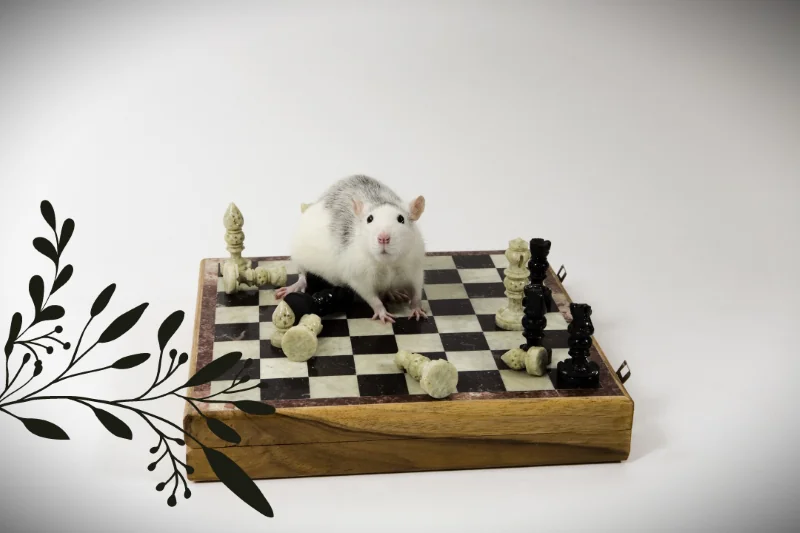The first step to solving a problem is correctly diagnosing and recognising it.
In this post, we will identify some of the main strategies that toxic, narcissistic or psychopathic people use to try to destroy our professional or academic careers.
1 – Smear Campaign: Badmouthing Others as a Favourite Habit
The number one weapon of narcissists is the word. It’s easy and free, and they’ve been trained to manipulate conversation in their favour from a very young age.
In this context, defamation is the most common tactic to destroy someone in the workplace. And it often works.
Narcissists launch a smear campaign against their victims from the beginning of a friendship or relationship, aiming to isolate them from their support circle. In addition, people will already have a defined side in a future breakup.
Narcissists are angry and envious of their sources of supply. And so, driven by these negative feelings, they can defame you in countless ways:
- Distorting what you say.
- Taking your words out of context.
- Using their power of argumentation to disqualify or worsen your words.
- Taking your jokes, sarcasm, and irony and passing them off as if they were serious.
- Revealing opinions and secrets that you confided in them and that should, therefore, have remained in the proper context. That is, in a private context.
- Mixing lies with truths to make everything they say about you seem trustworthy.
- Inventing complete nonsense about you that is entirely fictitious.
Narcissists need to be in control. Always. If the victims have ended the relationship or escaped a toxic environment, the narcissists have lost control over them.
If they can no longer control the victims directly, the narcissists will do everything they can to control how other people see them. Therefore, narcissists will try to destroy the victims’ relationships. This, in a narcissistic mind, maintains their position of control. And, of course, it is also a form of revenge.

2 – Plagiarising, Exploiting or Not Giving Due Credit to Others
Not giving credit appropriately to others and taking over the work or ideas of others are prevalent toxic behaviours, especially in the professional environment. In universities, we call this intellectual extractivism.
Sometimes the narcissist adds some changes here or there to the other person’s initial idea. And with that, he already thinks he deserves credit for that idea.
It is also common for the narcissist to see his subordinates, mentees and advisees as an “extension” of him, as intellectual “debtors”.
Therefore, narcissists understand that the production of people under his command or influence belongs to him. He cultivates the fantasy that those people only had those ideas or productions because of him in some way. Thus, the idea is also his, by right!
Finally, some blatantly plagiarise the work and thoughts of others verbatim. These people are not given to self-deception: they know very well what they are doing, and they don’t care—especially psychopaths or malignant narcissists.
Another reason why narcissists copy the behaviours, tastes, hobbies, ideas, etc., of their victims is that they are people without their own identities. To win over others, they pretend to have a false affinity.
This technique is what we call mirroring and borders directly on plagiarism, especially in professional environments.
Through mirroring, throughout their lives, narcissists build their public persona from various “pieces” that they have collected from their victims. Therefore, they are a “chameleon collage” of the people they envy or have had relationships with.
Narcissists are often not what they appear to be and do not have the knowledge or competence they claim to have. They mirror, plagiarise and steal the personality of others without the slightest remorse. Those who are most aware of their narcissistic or psychopathic traits do this in a very evil way, even to provoke and irritate the victim.
And it is not only people in positions of power who behave in this way. It is important to remember that anyone in adulthood can be a narcissist: any gender, sexual orientation, level of education, social class, religion, profession, nationality, ethnicity, etc. Anyone in any situation can behave in a toxic and narcissistic manner.
For example, many students (unfortunately, whether narcissistic or not) plagiarise books and academic publications, buy work done by others, cheat on tests, use artificial intelligence to generate texts and “lean on” their colleagues in college groups to graduate. Therefore, their diploma means very little in practice.
However, narcissists believe they are superior to all their classmates. They think they know more than even their professors and the most excellent experts in their field.
They do not respect the university, do not attend classes properly and do not have the willpower and humility necessary to acquire knowledge and professional experience.
Now and then, testimonies of “entrepreneurs” with evident narcissistic traits go viral, who are proud of having become rich and famous after dropping out of college.
But what paths did they have to take to obtain their wealth? Did they do it by paying fair wages or by exploiting others? Did they use social media and unethical digital marketing strategies to sell their products and services?
The fact is that many of these “entrepreneurs” would love to have a college degree, but they were unable to acquire the discipline necessary to learn complex knowledge. So, they construct a parallel narrative to mask this reality. To hide that they could not put their head down on the book and face the challenge of acquiring knowledge.
And, of course, in the case of narcissists and psychopaths, they didn’t get the diploma or the craft also because they have extreme difficulty with authority figures. Watching a professor lead a class for hours is unbearable suffering for them. Seeing classmates doing well in their grades, getting research grants, or doing cool internships devastates their ego!
In the minds of narcissists, they would always do better than others if they were in their place. And the success of others is always undeserved.
Arrogance and a sense of superiority are trademarks of narcissists. Feeling entitled to ignore, exploit, belittle, mirror and plagiarise competitors, too.

3 – Withholding Crucial Information
Narcissists withhold essential information from others, such as deadlines, notices, funding sources, bureaucracy, modus operandi, etc.
Companies and academia are full of unwritten rules. And those who do not have the privilege of getting good mentors cannot navigate them. These rules vary from institution to institution, unit to unit, area to area, country to country, etc.
So, if you have started a new job or changed sectors, you will need new mentors. And narcissists love to leave newcomers without adequate information, so that they become dependent on them. And, of course, to prevent them from reaching their full potential and the success they could.
Narcissists are inherently competitive, often viewing others as potential threats. This leads them to withhold crucial information from what they perceive as “competitors”, even when these individuals could be partners or collaborators.
I think the most obvious example of this is the university itself and the public service. Most professors and civil servants are tenured, but the environment remains uncooperative, toxic and highly competitive.
So people aren’t doing this for survival because they need to get promoted or can’t afford to lose their jobs. Instead, because we have normalised narcissistic and psychopathic cultures in the workplace.
4 – Misinforming, Spreading Fake News, Lies and False Data
In these cases, the narcissist goes beyond omitting: he blatantly instructs the victim to do the opposite of what is necessary for her to be successful.
When the victim discovers that she needs to be on the opposite path to achieve her goals, she is shocked that the narcissist could lie to her so boldly.
But this is how many narcissists act. In this “anything goes” situation, narcissists spread misinformation because information is power. Knowledge is power.
Narcissists may even suggest that the victim do something illegal, which could jeopardize her career. The more “involved” she is, the better for the narcissist because he has the victim in his hands.
And it also becomes more difficult for the victim to break the cycle of abuse, especially if she was an accomplice in something unethical. Or even if she did it alone, but he wrongly induced it.
And the victim knows that the narcissist knows about her mistakes. Therefore, she is afraid of blackmail and revenge if she escapes.
5 – Giving False Feedback: Undermining the Self-Esteem and Courage of Victims
Few things can be more damaging than false praise or unfounded criticism. Narcissists give misleading feedback all the time, consciously or unconsciously.
Since they live in a parallel universe that has little correspondence with reality, it is common for the narcissist’s view of the world and facts to be highly distorted. Therefore, their advice and opinions often do not correspond to the truth.
In addition, narcissists intentionally lie to their victims. Either by giving unfounded praise to manipulate them or by making untrue criticism to undermine the victim’s self-esteem.
In academia, a narcissistic professor may come to the realization that their students lack the typical traits for a successful academic career. However, the narcissist persists in nurturing them a false hope that they can succeed in their students for years. After they complete their postdoc, armed with a decade of qualifications and yet unemployed, they finally realize that they have been manipulated and callously discarded, feeling a profound sense of loss.
On the contrary, upon realizing that their student or mentee has great potential to surpass them, the narcissist tries to discourage and sabotage them with unfounded criticism.
The job market is saturated with competent, capable, well-educated people, especially in the business, management, intellectual or academic niche. Two of the biggest differentiators of success in this highly competitive context are self-esteem and the courage to take responsible risks.
Narcissists try to undermine both the victim’s self-esteem and courage by making her afraid to pursue her dreams and face obstacles to work at what she loves. He may do this by overstating the consequences of failure or by warning her that she is not “ready” yet. What the narcissist fails to tell his victim is that no one is ever ready: we often have to learn by doing.
When the narcissist cannot feel superior to others because someone has something they don’t have or is something they are not, the narcissist then achieves this (supposed) “superiority” in his mind by criticising, terrorising, and belittling others.
6 – Emotionally Destabilising the Victims at Crucial Moments in Their Life
Narcissists create confusion and drama at essential moments for the victim, such as birthdays, holidays, Christmas, end-of-year parties, graduations, weddings, funerals, exams, selection processes, etc.
Narcissists find a way to reverse this by any means when they feel that they are not the centre of attention. This can be by saying something absurd, threatening not to go to the ceremony, preventing the victim from getting a good night’s sleep, provoking an argument, vandalising things, minimising the joy or achievement of others, deviating from the event’s main focus in their speech, among other tactics.
In addition, narcissists ruin important moments to sabotage the victim. It is common for victims to report that on the eve of something very crucial, instead of providing full emotional support, the narcissist did the opposite: drama, fights, the silent treatment, disappearance, harsh criticism, triangulation, etc.
To give a few examples, it could be before an important lecture or event, a college entrance exam or public service exam, a selection process or job interview, or a crucial career meeting.
Narcissists take advantage of these special dates or professional occasions to obtain negative supply from the victim and also to sabotage their happiness and success.

7 – Maximising Mistakes and Highlighting Only the Problems of Competitors
Narcissists exaggerate the mistakes, defects and problems of others and other people’s work.
Small things take on an absurd dimension. Something you failed to include in a budget. A client who didn’t get a call right away. Or some weak point in your report, project, research, article, monograph, etc.
Everything else may be fantastic, but narcissists will focus on and highlight the victim’s flaws.
Narcissists are adept at using their authority to diminish the work of others, often focusing on insignificant details to devalue the entire project.
No work is perfect, but the narcissist makes the victim’s work seem much worse than it is. And they work hard to convince others of this. And because they do this constantly and systematically, they manage to create doubt.
They leverage their influence to promote the work of their “friends” and minions, while simultaneously undermining and discrediting the work of their critics.
8 – Influence Trafficking: Favouring Friends
Narcissists use their positions and contacts to traffic influence. Or to harm the victim’s approval in selection processes, competitions, publication of articles, promotions, job applications, etc.
In the academic world, narcissists agree with their colleagues to only invite people from their selected group to significant projects, papers and events. This also applies to grants approval and citations in articles. Thus, the bubble of the powerful becomes increasingly closed and stronger.
In the professional world, they try eliminating powerful or critical competitors, replacing them with “obedient lambs”. The narcissist, in a position of power, moves the pieces of this game to favour them as if it were a chess board.

Thus, people with the same affinities as the narcissist end up being privileged, to the detriment of criteria like competence or resume: relatives, friends, neighbours, fans of the same team, devotees of the same religion, activists of the same political party, followers of the same theoretical line or thought, etc.
Narcissists have double standards. They apply the “rigour of the law” to their enemies and ease up on their friends, even if they made this “law” unfair.
In fact, narcissists are experts at making rules at work that favour themselves and their allies.
9 – Manipulating People to Do Their “Dirty Work” for Them
In the Narc Thesaurus, flying monkeys are the narcissist’s followers who do their “dirty work” for them. They are their minions. The term refers to the flying monkeys in The Wizard of Oz.
Enablers act the same way, but usually without realising they are doing something wrong. They are also victims who believe in the narcissist and defend him, unfairly pitting themselves against other victims.
Narcissists use their army of flying monkeys and enablers to harm people in their place, with the narcissist being the one behind the attack.
For example, a sales manager may pass the worst customers, the most problematic ones, to a salesperson, preventing her from reaching her goal.
Or a journal editor may pass the victim’s article on to the most complicated, convoluted reviewers who give nonconstructive criticism or “bomb” their competitors’ papers.
The narcissist may, directly or indirectly, suggest ways in which the flying monkeys can harm and attack the victim. And they will. Either because they are also narcissists and have their agendas. Or because lies have deceived them.
And so coworkers may isolate or undermine an employee or another manager because the boss has been running a smear campaign against her behind the scenes. And the harassed, stressed employee may actually start acting out in toxic ways.
This is what we call reactive abuse: when the victim reacts badly to an abusive context. And then the narcissist uses the victim’s reaction to corroborate his smear campaign and turn everyone against her.
An example is an employee speaking angrily or crying during a meeting. It seems that the employee is the problem.
But what no one knows is that this was the last straw for all the abuse that is happening behind the scenes. And there, in the meeting, the narcissist made some veiled provocation to generate this type of reaction in the victim. And, thus, make her lose control in front of others.
In the academic environment, students can harass and even verbally or physically attack a professor because he or she has been smeared behind the scenes by other malicious and envious colleagues. Then, the professor begins the semester with the class’s enormous resistance to the course and her.
Envy, competitiveness, lies and conspiracy. Manipulating others in their favour is one of the main strategies of narcissistic, psychopathic or toxic people who have normalised venal work cultures.
In addition to dealing with the discovery that narcissists have exploited them, many victims still have to deal with the pain and guilt of having been used as pawns to hurt others, without even realising it.
10 – Lawfare: Weaponizing the Legal System
In this same spirit, the narcissist uses the judiciary and other instances of power to sue the victim, accept slanderous accusations, initiate unfounded investigations, etc.
It is often quite evident that the victim is innocent, and the case will end in their favour. However, the simple fact that they have to spend time, energy, and money defending themselves is the goal.
The intention is also to defame them because, in the “court” of social media, you are already guilty if you are being sued. Therefore, the narcissist uses websites and posts on social media to publicise the lawsuit, disregarding confidentiality and the presumption of innocence.
Narcissists drag out legal disputes as long as they can, to expand the defamatory campaign and to exhaust the victim’s energy with that pending matter. They use the slowness of the system to their advantage in their attack strategies.
These tactics are especially perverse when narcissists are rich or powerful. Because they will enter the court with all their influence and a legal arsenal that the victim does not have.
And many times, the narcissist may win the case unfairly because there was no “equality of arms”. Or even because the narcissist resorted to underhanded means to win, such as bribes and dragging the case out until the statute of limitations, among other strategies.
Finally, narcissists and toxic people can use their positions of power to dominate the market by distorting the objectives of professional councils, unions, professional bodies and other representative institutions.
Narcissists in leadership positions pretend to fight for a cause, but only represent their interests. Not the interests of education, culture, the professional category or society as a whole.

11 – Ad Hominem Attacks: Hiding Behind Anonymity
Narcissists hide behind anonymity all the time. The most common way to do this is through fake accounts on social media.
With these accounts, narcissists post malicious comments, promote fake news, and troll their competitors and ex-relationships. And the list of possibilities is just beginning.
In the workplace, narcissists use anonymity in performance evaluations, in peering reviewing scientific articles or the merit analyses of grants.
Hidden behind anonymity, they write unfair reports and make ad hominem attacks. These attacks seek to discredit the author of a work or idea. And they do not evaluate what should actually be assessed: the merit of the production or proposal itself, not the person behind it.
12 – Stalking, Moral and Sexual Harassment
Some of the most perverse manifestations of narcissistic abuse occur through moral and/or sexual harassment. Narcissists bother or harass the people around them, often in an outrageous and public manner, so sure are they of their impunity.
Another tactic that narcissists use to harass others is to mix professional and personal relationships inappropriately. This is a challenge, especially in Brazil, where romantic or friendly relationships are often established in work environments.
Human warmth, risqué jokes, horizontal relationships and informality – such remarkable aspects of Brazilian culture – in the hands of narcissists become circumstances conducive to abuse.
Narcissists feign friendship so that people will let their guard down and reveal their secrets, personal problems, privileged information, difficulties at work, etc. They will use all of these in the process of manipulation, blackmail, obtaining advantages and covering up their mistakes.
Finally, narcissists fake “chance encounters” in the hallway to establish conversations with their victims that should take place in an official context, such as scheduled meetings and events. And then they go around saying that “everything is resolved” with that person. Or that the person said “this or that” when the conversation occurred in a wholly induced and informal context.
Whether it is veiled harassment, disguised as inappropriate jokes, or something aggressive, such as stalking, narcissistic abuse and harassment cause countless harm and psychological trauma to victims. It can jeopardise people’s careers or, at the very least, their mental health.
13 – Playing Lonely: Not Knowing How to be a Team Player
Fortunately, the professional market doesn’t always have to be like a tennis match, where the goal is to “cut” the competition out. The work environment can be like beach tennis: everyone wins, has fun, and no one lets the ball drop.
But narcissists don’t play like that, even when they could. They always play a win-lose game, in which the winner takes the prize and destroys the opponent. Healthy people play a win-win game in which the winner takes a lot of people with them. And everyone wins in some way.
Narcissists don’t know how to work as a team, have extreme difficulty delegating, micromanage their subordinates, and try to make the company, institution, or boss dependent on them in some way.
They always want to bring others down and make themselves indispensable in an unhealthy way.
It’s a zero-sum game at the end.

14 – Sabotaging the Competition
Malignant narcissists or psychopaths literally sabotage their colleagues, bosses, institutions and companies. In other words, this is not just a veiled toxic behaviour but a deliberate and often criminal action.
They can prevent others from doing their jobs, making working conditions as difficult as possible, such as:
• Not providing adequate time or equipment to perform tasks. Therefore, they do not meet the minimum quality of life conditions at work but demand high performance from the employees anyway.
• Organising official communication and teamwork management using WhatsApp and emails, not professional planning software, where everything is transparent and everyone knows who is doing what, who said what, etc. Where everything is recorded and, therefore, more challenging to manipulate and sabotage.
• Not complying with company standards, labour rules, agreements defined by the team, orders from superiors, etc.
• Prohibiting remote work without a plausible justification to control and exercise power over employees.
• Criminally altering reports, data, codes, equipment, etc. Sometimes, it even risks people’s safety or the company’s survival.
• Falsifying or altering messages, emails, videos, audio, screenshots of conversations, among other “evidence” that they will use to harm competitors and to do well for themselves.
Narcissists use their charisma, knowledge, network of contacts, position, money or status to boycott others in every possible way.
Narcissists believe they are above the law and are confident they will get away with it, even when they do these things in broad daylight. Working with narcissists, psychopaths, and toxic people is like moving through a minefield.

15 – Sprezzatura: Normalising Insane Productivity Standards
Sprezzatura1 is the ability to act indifferently or with the appearance of little effort when performing demanding and complex actions. This blasé air of sprezzatura can also mask the actual sources of success or result.
In the first situation, the narcissist appears to do with ease and grace something extremely difficult to perform. Like a ballerina who flies happily through the air as if she were a butterfly but makes an enormous muscular effort and feels horrible pain while dancing.
To give an example from the management world, the main topic of this blog, narcissists pretend that their lives are simultaneously productive and leisurely.
It seems easy when the narcissist describes his successful routine in all aspects of his life: work, business, health, intense intellectual activities. Everything flows wonderfully!
He has the key to control everything and live a disciplined, serene and happy life. After all, narcissists feel like the king of productivity. They think they are a machine! Their desk looks impeccable and tidy, but in the drawers, there’s trash everywhere.
Oh, if only we could see what really goes on behind the scenes…
In real life? Their children barely see their faces; their spouse takes care of everything at home; they scarcely sleep and are always running around. Their high productivity was achieved at the cost of lots of coffee and alcohol to cope with the pressure and meet deadlines. Sometimes, they resort to even more drastic things, like cocaine and other stimulant drugs.
And the narc will still look down on you as if you were the lazy incompetent. After all, success for him is very “natural” to achieve. He got it faster and earlier than you because he is the “best”!
In the second situation, when the real source of success is masked, the narcissist also acts with an air of sprezzatura. After all, he never delays work and produces much more than the average person. But that’s because… he didn’t do that all by himself.
Did he write a bunch of highly cited scientific articles? The narcissist only signed those papers; his students and research partners did most of the work. Did the sector that the narcissist manages break sales records in the last quarter? It’s because he terrorised each of his employees so that the goal could be achieved.
In Brazil, we have a famous saying:
A parrot eats corn; a parakeet takes the fame.
Narcissists act with sprezzatura when they normalise unsustainable standards of productivity. When they impose standards on others that can rarely be achieved by people who prioritise good values and quality of life.
Everyone has 24 hours a day. Sleep consumes about eight hours. Personal matters and the demands of life theoretically burn up another eight. That leaves eight hours for work. If someone does several things at a high level but claims only to work eight hours daily, be suspicious.
Either this person’s work fills their long resume but is not of good quality. Or the production has quality, but he’s taking credit for the work of others. Finally, the last option: he’s bright and outstanding; his production has real value and quality, but he works much more than eight hours daily.
In short, many psychopaths and narcissists are workaholics. In a competition for a job, promotion or grant, the narcissist wins if the analysis is merely based on results because they will go over everyone and everything to get what they want, including compromising their own well-being.
Workaholic narcissists do not have a healthy personal life. They seriously neglect their partners, children, family, friends, colleagues, sleep, health, etc. They even work on weekends and holidays. Many narcissists exploit their subordinates, interns and students so that they can pad their resumes for them.
These are the most dangerous because they reach high levels of power and success. But at what cost?
One of the most tremendous damages narcissists cause in the academic or professional environment is establishing and normalising productivity standards that they can only achieve at the expense of their own health, personal life, family, exploited subordinates, free time, ethical values or quality of life.
Turning the Tables
We must stop being naive and projecting our character and good values onto others.
It’s hard to believe what narcissists are capable of because we tend to measure others by ourselves. But some people are really evil and willing to harm others intentionally. And they will do everything they can to destroy us at work and in our academic lives.
Now that we know how to recognise some of the main poisonous behaviours used by narcissists, psychopaths and toxic people, let’s act with more care, prudence and strategy in our professional relationships. We are going to talk about all of this in the following posts in this series on narcissism.
Did you resonate with this essay? There is still time for you and me to turn this game around…

Notes
1 – Sprezzatura is an Italian term published in the book The Courtier by Baldassare Castiglione. Also known as “the art of hiding art”, it means trying to make something challenging to achieve seem easy.
Acknowledgements: Thanks to Alberto Nogueira Veiga and all who gave me their precious feedback. I would also like to thank the authors, researchers and content producers on narcissism, psychopathy, and toxic behaviours in work management for opening my eyes to this crucial issue.
Images: Pexels, iStock, Unsplash, Pixabay.
Please help me improve my English by sending me your suggestions through this contact form. Thanks!
Published on my blog in Portuguese on September 13, 2024: 15 estratégias perigosas que narcisistas e pessoas tóxicas utilizam para destruir a sua carreira profissional ou acadêmica













